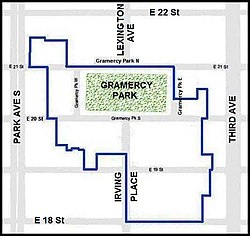Gramercy (Manhattan)
| Gramercy Park | |
|---|---|
| Neighborhood and park in Manhattan | |

The view from the south gate of Gramercy Park, looking north from Gramercy Park South (East 20th Street), with the statue of Edwin Booth in the center. The Gramercy Park Hotel is visible in the left background. (May 2007)
|
|
| Coordinates: 40°44′16″N 73°59′10″W / 40.73778°N 73.98611°W | |
| Country |
|
| State |
|
| City |
|
| Borough | Manhattan |
| Population (2010) | |
| • Total | 27,988 |
|
Gramercy Park Historic District
|
|
 |
|
| Location |
Manhattan, New York City Roughly bounded by: |
|---|---|
| Coordinates | 40°44′16″N 73°59′10″W / 40.73778°N 73.98611°WCoordinates: 40°44′16″N 73°59′10″W / 40.73778°N 73.98611°W |
| Architectural style | Greek Revival, Italianate, Gothic Revival |
| NRHP Reference # | 80002691 |
| Added to NRHP | January 23, 1980 |
Gramercy Park/ˌɡræmərsi ˈpɑːrk/ is the name of both a small, fenced-in private park and the surrounding neighborhood that is referred to also as Gramercy, in the New York City borough of Manhattan in New York, United States.
The approximately 2-acre (0.81 ha) park, located in the Gramercy Park Historic District, is one of two private parks in New York City – the other is Sunnyside Gardens Park in Queens – as well as one of only three in the state; only people residing around the park who pay an annual fee have a key, and the public is not generally allowed in – although the sidewalks of the streets around the park are a popular jogging, strolling and dog-walking route.
The neighborhood, which is divided between New York City's Manhattan Community Board 5 and Manhattan Community Board 6, is generally perceived to be a quiet and safe area.
The neighborhood, associated historic district, and park have generally received positive reviews. Calling it "a Victorian gentleman who has refused to die", Charlotte Devree in The New York Times said that "There is nothing else quite like Gramercy Park in the country." When the New York City Landmarks Preservation Commission created the Gramercy Park Historic District in 1966, they quoted from John B. Pine's 1921 book, The Story of Gramercy Park:
...
Wikipedia
